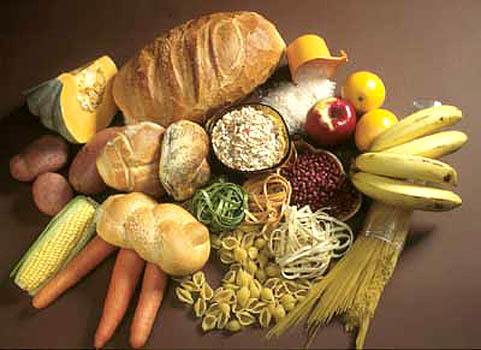|
How to Choose Your Carbohydrates
May 26, 2009
|
|
|
|
|
|
How to Choose Your Carbohydrates
|

Knowing how to choose the proper
carbohydrates best suited for your metabolism is a nutritional art within
itself. Some of us burn carbs rapidly, others are slow burners. The question
is: are you a fast burner (fast oxidizer) or a slow burner (slow oxidizer)?
Understanding this concept can help prevent degenerative diseases such as
diabetes, cancer, and obesity. Learning the monitoring system in my book, ProMetabolics, will make it easy to
understand what carbs would be best for you, but this article will give you an
idea what foods to use.
|
|
|
|
| The Autonomic Nervous System
|
 We are going to discuss the
autonomic nervous system which is the master regulator of your metabolism. It
controls the involuntary activities of the body: heart beat, respiration, digestion,
tissue growth, temperature, hormone secretions, and many more functions. The
autonomic nervous system has two dualistic opposite parts that counterbalance
each other: the sympathetic and parasympathetic divisions. The sympathetic side
turns on the energy, utilizing organs such as the adrenals, thyroid, and
pituitary that prepare the body for fight or flight. The parasympathetic
nervous system turns on the glands pertaining to digestion, elimination,
repair, and rebuilding.
We are going to discuss the
autonomic nervous system which is the master regulator of your metabolism. It
controls the involuntary activities of the body: heart beat, respiration, digestion,
tissue growth, temperature, hormone secretions, and many more functions. The
autonomic nervous system has two dualistic opposite parts that counterbalance
each other: the sympathetic and parasympathetic divisions. The sympathetic side
turns on the energy, utilizing organs such as the adrenals, thyroid, and
pituitary that prepare the body for fight or flight. The parasympathetic
nervous system turns on the glands pertaining to digestion, elimination,
repair, and rebuilding.
The following chart, taken from page 81 in ProMetabolics,
will give you a better look at each
system and their counterbalancing activities.
Sympathetic-Controlled
- Pupils dilate
- Heart rate increases
- Intestinal functions slow down
- Bladder contracts
- Liver releases glucose
- Stomach decreases digestive secretions
Parasympathetic-Controlled
- Pupils contract
- Heart rate decreases
- Intestinal functions speed up
- Bladder relaxes
- Liver stores glucose
- Stomach increases digestive secretions
|
|
Carbohydrates in the Diet
|

Choosing the wrong foods,
especially carbohydrates, can effect and actually stimulate or sedate these
nervous system functions. Too little of an amount can be a problem; too much
can be a problem; and poor quality can create disease. Carbohydrates do not
build healthy tissues, enzyme systems, hormones, nor do they strengthen the
immune system. Around 15 grams of carbohydrates in the form of glucose are in our
blood stream all the time. They are usually in transit in our blood stream and
are required for our body's energy systems.
Carbohydrates are the basis of our
cellular fuel. They are digested and broken down into glucose (blood sugar) and
burned up (oxidized) by our cells for life functions. These can also furnish
other valuable nutrients such as cellulose (vegetable fiber), vitamins, amino
acids, and minerals. Let's examine two classes of carbohydrates - complex
carbohydrates and natural simple sugars vs. refined carbohydrates.
Complex carbohydrates are starches
in their natural state such as potatoes, whole grains, starchy vegetables (best
choice), and legumes. These starchy molecules are more complex with more
nutrition than simple sugars in raw
fruit. They require a longer and slower
digestive process before they're ready to be used as fuel (glucose) for our
cells. They are a more controllable
fuel source.
Simple carbohydrates such as sugars in raw
fruit, refined carbs like candies, sodas, jellies, ice cream, alcohol,
pastries, processed breakfast cereals, pastas, you know the rest, dramatically
alter your metabolism and can be addictive. They not only alter metabolic
activities but cause behavioral and mood changes, just like a drug can. Nothing
against drugs (medicinal), of course; everything has its time and place.
When carbohydrates
are refined (fibers, vitamins, and minerals removed), they are explosive in the
body, providing fuel too rapidly. The body cannot control them. Enzymes get
used rapidly, blood sugar rises, and the excess sugar is stored as fat. And
we're on our way to pancreatic problems and obesity. That's the difference
between a controllable complex carbohydrate and an uncontrollable simple sugar.
Fruits are a little different. They're only about 15% simple sugars while
refined pasta can be 75% simple sugars. I'm a 100% Italian--boy, this one
hurt. But, of course, we can enjoy these luxuries once in a while. We want to
eat foods the body can control, not fuel injections of sugar. Some of us choose
not to use grains at all and get their carbohydrates from fruit, vegetables,
and small amounts of fruit. I'm one
of those people. If I feel as though I need a grain, I use spelt. It's an
ancient grain superior to other grains and less allergenic. It dates back
10,000 years and is mentioned several times in the Old Testament. (Exodus 9:
31, 32.)
|
|
"Slow" and "Fast" Carbohydrate Oxidizers
|

To make this concept about whether
you're a slow or fast oxidizer of carbohydrates easy to understand, I will list
symptoms to give you an idea. It's obvious you're a slow burner if you're
tired, have low blood sugar, chronic fatigue, put on weight easily, and have loose
bowels possibly. A fast burner metabolizes and digests almost everything very
easily. They seem to have a lot of energy.
If the lifestyle is improper, their symptoms can include: high blood
pressure, insomnia, irritability, indigestion. But they are highly motivated
people. This can be a little confusing because we see a mixture of these
conditions and energies in most people. When we use the proper carbohydrates,
we can balance both sides of the coin, a yin-yang concept. Learn the monitoring
system in ProMetabolics which will
answer your questions about what foods are best for you.
|
|
The Best Carbohydrates
|
 The safest source of carbohydrates
(meaning less explosive insulin reaction) comes from plants and roots,
including beans, carrots, pumpkin, squash, lentils, Jerusalem
artichokes, and pre-digested or sprouted grains.
The safest source of carbohydrates
(meaning less explosive insulin reaction) comes from plants and roots,
including beans, carrots, pumpkin, squash, lentils, Jerusalem
artichokes, and pre-digested or sprouted grains.
Rice,
whole grain wild or brown rice, with their fibers, is good. Barley, quinoa,
millet (an alkaline producing grain), amaranth (a complete protein), kamut, and
spelt are also good. Wheat would be your last choice and should be sprouted.
Sprouting neutralizes most of the gluten and renders the grain less acidic than
common wheat.
To
sum it up, get to know your body by how you feel and how well you digest your
foods. Take concentrated food supplements like Juice Plus+® (find
a distributor in your area). Ultimately, learn to watch your saliva and urinary
pH after meals (see ProMetabolics).
You literally are what you digest. And remember; use large amounts of green
foods. If you're green inside, you're
clean inside.
|
| Books by Dr. Smokey Santillo
|

Dr. Smokey Santillo's latest book, ProMetabolics, and his classics Food Enzymes and Natural Healing with Herbs are all available through his publisher Designs for Wellness Press with Dr. Roy Vartabedian. Click HERE to order your copy of these highly informative and practical publications today.
|
|
|
|
|
|
|